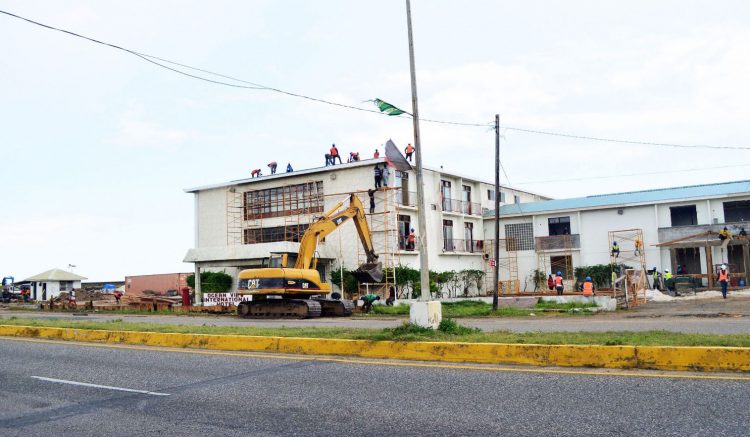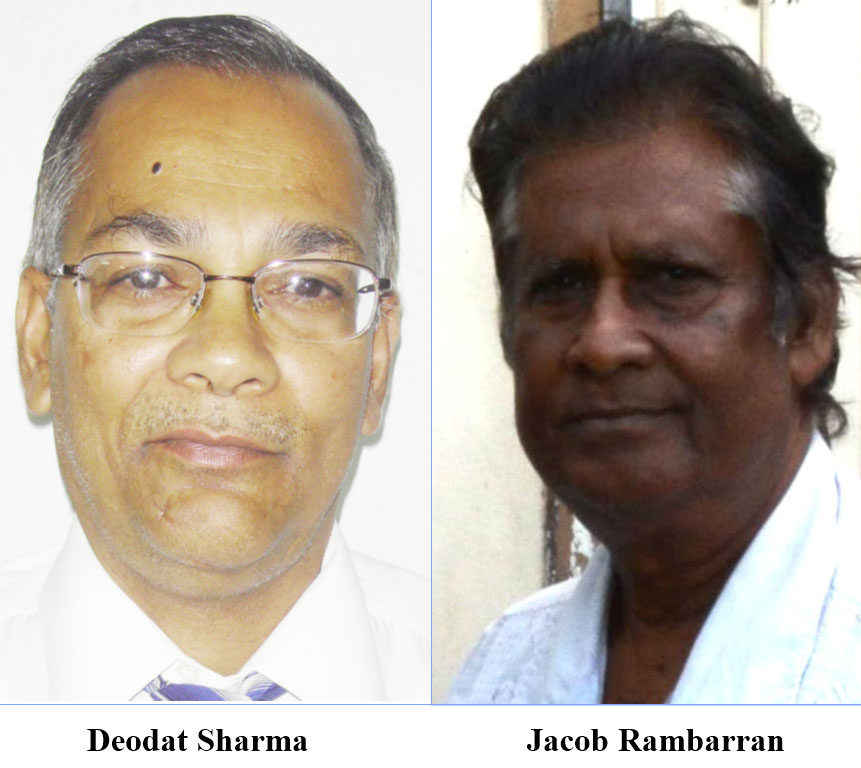Government’s billion-dollar expenditure on the decrepit Ocean View Hotel to construct a COVID-19 hospital has attracted the scrutiny of Auditor General Deodat Sharma and a local transparency group even as the current owner Jacob Rambarran maintains silence on the terms of the controversial deal.
Sharma told Sunday Stabroek that he has already cautioned about accounting practices for the $1 billion sanatorium project at Liliendaal.
“We are watching spending for the COVID-19 emergency and this Ocean View project is of concern,” Sharma said.

“A circular was issued by the Finance Secretary to all procuring entities on the protocol for spending during the lockdown and how the accounting practices are to be logged. They were told that [they] must [keep] separate ledgers and bin cards and even though you have the sole sourcing it must go through the rightful process,” Sharma added.

“It is reported that the hotel owner is a supporter of the party. The mathematics here too… and I am beginning to wonder how many times there has been these hundreds of millions,” he added.
Collins said that TIGI plans to examine the Ocean View issue at its next meeting on Tuesday and will then make a pronouncement.
The Ocean View venture has parallels to another project which drew the APNU+AFC government into disrepute – the transformation of D’Urban Park into a stadium in a public/private venture that has left many questions unanswered about how much taxpayers’ money was spent and whether the Procurement Act was complied with.
As regards the construction of the D’Urban Park Stadium, the Auditor General has reported extensively as regards irregularities in that project and he said he hopes that the situation would not recur the current one at Ocean View.
But while both projects will leave the state to fork over billions for ventures with no clear-cut planning, they fall under different circumstances.
In 2015, there was no emergency to justify the absence of competitive bidding for the D’Urban Park Stadium and at the time of construction APNU+AFC had just entered office and there was no approved budget in place and therefore the related expenditure was not authorised by the legislature.
However, the government has defended the hundreds of millions to be spent on Ocean View as an emergency move.
Dedicated
On April 4, de facto Prime Minister Moses Nagamootoo, who is Chairman of the National COVID-19 Task Force (NCTF), told a virtual press conference that the hotel had been identified to be transformed into a dedicated COVID-19 hospital.
“…We have looked at the proposal for a dedicated hospital and we have identified a building [in] the immediate vicinity of the city on the East Coast, the Ocean View. What used to be the Ocean View Hotel and what is now going on there [is] to make that into a dedicated hospital, dedicated facility for…isolation or quarantine or medical attention of persons who have been confirmed positive of the coronavirus disease,” Nagamootoo said.
Nagamootoo added that several other buildings, including one on High Street at the site of the former Guyana Broadcasting Corporation (GBC), the National Gymnasium and the Cliff Anderson Sports Hall were also being inspected to be potential COVID-19 facilities.
The consideration is based on a suggestion made by the Pan American Health Organization/ World Health Organization (PAHO/WHO) for the establishment of a specific COVID-19 hospital in light of dire projections that the COVID-19 pandemic could overwhelm the health system here as there were a limited number of hospital beds for infectious patients.
Later, on April 16, then Director General of the Ministry of the Presidency Joseph Harmon told the media that while the Ocean View Hotel was being converted into the first dedicated COVID-19 hospital in the Caribbean, the financial arrangements around that conversion were still being worked out.
The hotel was first owned by George Lord, who had remigrated to Guyana during the 1980s, and opened the ocean front facility in the early 1990s to much acclaim. However, the hotel started losing occupancy after complaints of lowered standards in the late 1990 and this was exacerbated in 2007 when several other hotels were built for the 2007 Cricket World Cup.
It was late that year that Lord sold the property, which also housed a large convention centre, to RBS Chanel 13 proprietor Jacob Rambarran. However, in 2009, the three-storey hotel complex went into receivership and this newspaper understands that there are still “some financial issues” between Lord and Rambarran.
The hotel never regained its foothold in the local hospitality sector and severe overtopping from the Atlantic in 2013 saw it having to shut its doors. Its use thereafter was limited, although it came in for scrutiny from the Audit Office in 2018, when it was revealed that it was among the facilities with which the Public Health Ministry entered into rent-free arrangements to have drugs and medical supplies temporarily stored.
The 2017 Auditor General’s report, presented to the National Assembly in 2018, singled out the conditions at the Ocean View International Hotel and included photographs to show the poor storage conditions there, including a termite infestation, and some damage to the items that were being stored.
According to the report, the drugs were stored in seven rooms at the hotel and the manner in which the items were packed made it difficult to conduct a stock count, as they were not arranged in the manner that made them easy to access and check. “In addition there was evidence of termite infestation in the rooms and damage to the boxes and items stored…The extent of the damage could not be determined at the time of physical count,” it said.
The report added that the ministry’s response to these observations was that a decision was taken to utilise the hotel to store medical supplies rather than pharmaceuticals, which need air conditioning to maintain potency. “The proprietors have treated the rooms against termites and rodents to avoid damage to the items,” the ministry said in response to the findings.
‘A good deal’
Following the start of works to transform the hotel, de facto Minister of Finance Winston Jordan indicated that it will cost taxpayers over $1 billion to transform the hotel into a specialised care facility.
Asked if the cost included a purchase price, Jordan said that was a “different matter which can’t be dealt with at this time.”
Frenetic work with dozens of labourers immediately began at the facility as major structural changes were required and a new section has been added to the building.
However, late last month there was another twist when the government gazetted a notice that it was seeking to compulsorily acquire the property. The order was signed by de facto Minister of Public Health Volda Lawrence under the Acquisition of Lands for Public Purposes Act.
The order would suggest that the government had been unable to reach a deal with Rambarran. Use of the compulsory acquisition provision has usually been seen as draconian and retrograde.
This newspaper reached out to Rambarran, who said that he was still in negotiations over a price for the property but was confident that he will be satisfied when the deal is completed.
“I have confidence in the President and Minister of Health that I will get a good deal,” Rambarran told Sunday Stabroek, even as he explained that because it was an ongoing negotiation, he did not at this time wish to discuss any details.
When asked about the issue of government acquiring his property via compulsory acquisition he again said that he could not discuss it. “I am a businessman and I have to be mindful of what I say,” he said.
It is unclear how the contractors were selected for the project. Specifications for the project have also not been released.
The procurement of goods, services and the execution of works are governed by the Procurement Act of 2003 which promotes competition among suppliers and contractors, as well as fairness and transparency in the procurement process.
Five methods
Three are five methods of procurement, namely (1) the use of a system of quotations for lower value procurement; (2) open tender; (3) restricted tender for specialized items available from a limited number of suppliers; (4) sole source procurement in specific circumstances; and (5) procurement through community participation especially in remote areas.
Section 28 (c) of the Procurement Act provides for single-source procurement when “owing to a catastrophic event, there is an urgent need for the goods, services or construction, making it impractical to use other methods of procurement because of the time involved in using those methods”.
The rehabilitation of the Ocean View Hotel falls under this category. According to the order signed, the hotel will be compulsorily acquired by the government and, therefore, becomes the property of the Ministry of Public Health, when the deal is completed.
Former Auditor General Anand Goolsarran and Public Procurement Commission (PPC) Chair Carol Corbin both say that regardless of how state services are procured, they must fall under the law.
“Notwithstanding the emergency nature of the rehabilitation works at the former Ocean View Hotel, one would expect that reputable contractors, suppliers and consultants would be selected from the Minis-try’s database of registered suppliers and contractors. One hopes, also, that there was consultation and collaboration with the National Procurement and Tender Administration Board as well as the Public Procurement Commission, especially as regards the reasonableness of the cost estimates,” Goolsarran said of the projected $1 billion spending on the construction.
Corbin said that up to two weeks ago the National Procurement and Tender Administration Board (NPTAB) was not aware of any procurement for services contracts for the project.
“The PPC had communicated with the NPTAB to find out if there were any tenders, when the understanding that this was just probably going to be an arrangement where the government was renting the building. We thought there was a procurement for construction and were just trying to find out what tenders were in connection with the actual work being done. We tried to find out if there was any work for the renovation but at the time of that communication there was none,” she explained.
Corbin said that she read this newspaper’s report that the building was being acquired through compulsory acquisition and said that her agency has not fully analysed the laws governing that process and the procurement of works.
“I am not aware of any tender process used for that and since I don’t know if there are any activities, one may have to read all the provisions to see what activities are covered,” she explained.
“I don’t have enough information as yet to say how this process should go in terms of the construction that is actually being undertaken. We don’t know if it is covered under the act of compulsory acquisition. We are still in the process of examining that,” she added.






